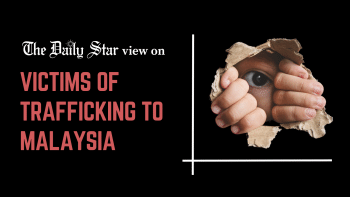Why are so many seeking asylum in Europe?

We are alarmed by the latest report of the European Union's Agency for Asylum (EUAA) that has revealed that a staggering 40,332 Bangladeshis—who went to Europe with or without proper documents—filed for asylum in 2023, breaking previous records. Among the countries receiving applications were the 27 EU countries as well as Norway and Switzerland. This figure, we must say, is quite shocking even if the trend is not. And it does raise uncomfortable questions about a country trying to raise its profile on the global stage.
Normally, you would expect this from countries ravaged by war or famine or severe economic shocks. Bangladesh, at least on paper, fits neither of the criteria nor does it acknowledge the reality of political persecution or fear thereof, which can also fuel a pursuit of asylum. Yet, according to an expert, major reasons for the unprecedented surge in asylum applications include political unrest, repression, and the quest for personal security. This is hardly surprising given our tumultuous political climate. However, beyond these traditional grounds for asylum lies a more ubiquitous crisis: the absence of opportunities at home. Economic aspirations otherwise unattainable within Bangladesh's borders—with the number of unemployed graduates doubling in five years since 2016-17—are compelling many to look beyond, despite slim chances of achieving refugee status in Europe.
The EUAA report thus affords us a look into the desperation of people trying to migrate to greener shores, and asylum is but one of the avenues through which they can attain legal work/residence permits. We need to understand the nuances of this trend to fashion a better response. A large part of the problem is the role of recruiting agencies and trafficking syndicates promising a better future abroad. We have often seen aspirant migrants risk everything to reach Malaysia, which has recently halted the intake of foreign workers, or Libya, which is often used as a transit to Europe. We know how many saw their dream come to a ruthless, premature end. But despite repeated urgings, the government has done little to curtail the influence of these recruiting or trafficking syndicates. This has to change.
We urge the government to take the EUAA report with the seriousness that it deserves. It must address, through meaningful actions, the economic and political reasons forcing people to undertake perilous journeys abroad.


 For all latest news, follow The Daily Star's Google News channel.
For all latest news, follow The Daily Star's Google News channel. 










Comments